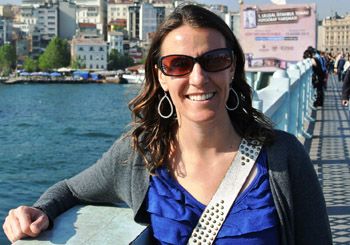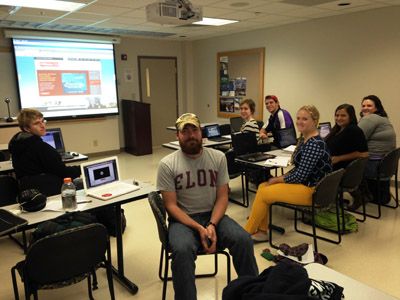H-German Historian Network Honors History Course for IWitness-Based Final Assignment

H-German is an online network for historians of Germany around the world to share resources, contacts and discussions about their field. Each year H-German holds a contest to recognize exceptional course syllabi submitted by history professors around the world. In addition to categories for seminars, graduate courses, general courses, and courses about Nazi Germany/Holocaust, the H-German editors recognize syllabi that have the most “interesting assignment.” Kravetz received an honorable mention in this category for the 2015 contest.
The final assignment for Kravetz’s Modern Germany course in Fall 2014 was for each student to create a 4-5 minute digital essay in IWitness about German identity before, during and after World War II, focusing on one person in the Visual History Archive and how his or her sense of identity changed during that time. The videos included at least three clips of testimony (from only one testimony), five images, five textual explanations and 30 seconds of reflection at the end. Kravetz said by only allowing them to include one testimony and limiting the videos to five minutes, she wanted her students to practice discerning the best sources for a particular paper or research project.
Kravetz said she was very impressed with the videos her students made. The videos were very polished and many had really grasped the idea of testimony and how it could be worked into an academic argument. The most common feedback they provided about the assignment itself, in fact, was that they wanted the videos to be longer so they could include more content. Student comments at the end fo the semester included:

"At the beginning I was a little skeptical [of the digital essay project] but in the end I really liked it. It was so interesting to work with the testimonies."
"The project was absolutely a challenge but I loved it. I was able to use my own interests with design and incorporate those skills into my video. It took probably 10X the amount of time a paper would but I took more interest and I think I learned much more."
Kravetz was first introduced to IWitness through IWitness manager Jenna Leventhal, who was a fellow undergraduate history major at UC Santa Barbara over 10 years ago. Kravetz said she was looking for an innovative project for her small class (only seven students), and Leventhal suggested that Kravetz assign her students a “digital essay.”
Leventhal also suggested that the students include a short reflection at the end of their videos, and Kravetz said this was one of the best aspects of her students’ work. She could tell they had thought seriously about what they wanted to say and had practiced beforehand.
On the last day of class, Kravetz screened all the videos and invited her colleagues from the department to come watch as well, and the dean of the Longwood University College of Arts and Sciences decided to use the project as an example of innovation in the college.
Though she may make some changes to the assignment, Kravetz said she’s interested in assigning it again in her Nazi Germany class next year. She was unsure at first that there would be enough relevant testimonies for her students to choose from, but was pleasantly surprised by the breadth and depth of topics contained in the Visual History Archive.
“The testimonies were really spot-on,” Kravetz said. “It’s almost as if [the survivors] read my essay questions beforehand.”